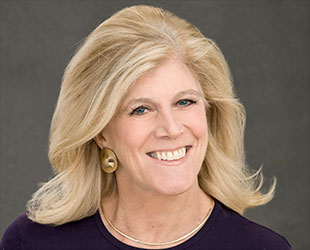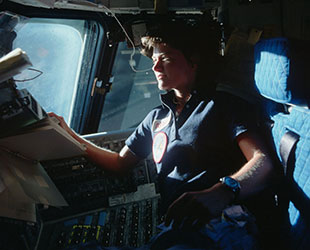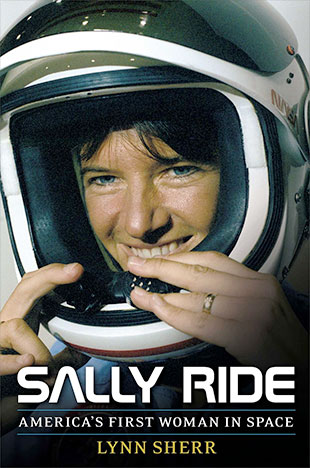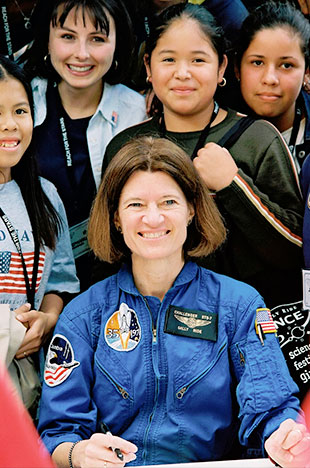June 3, 2014 — Lynn Sherr knew Sally Ride.
As a veteran journalist for ABC News, Sherr had helped to introduce Sally Ride to the world as the teen tennis player-turned-physicist who in 1978 was selected among NASA's first female astronauts. Sherr then covered Ride becoming the first American woman to fly in space six years later.
Along the way, the two became friends.
But like most of the world, Sherr was surprised on July 23, 2012 when Ride succumbed to pancreatic cancer and died at age 61. Sherr didn't know Ride had been ill.
Nor did Sherr know that Tam O'Shaughnessy, Ride's long-time business partner, was also Ride's life partner of more than 25 years.
Sherr was not alone. Sally K. Ride, one of history's most famous astronauts, had kept her personal life secret, even from many of her friends.

Lynn Sherr, ABC News broadcaster and the author of "Sally Ride: America's First Woman in Space." (ABC News/Steve Fenn) |
But within days of her passing, O'Shaughnessy and Ride's family members decided it was time to share more about the Sally Ride they knew and loved. The job fell to Sherr once again to introduce Ride to the world.
In "Sally Ride: America's First Woman in Space ," released Tuesday (June 3) by Simon & Schuster, Sherr reveals the woman behind the trailblazing astronaut.
," released Tuesday (June 3) by Simon & Schuster, Sherr reveals the woman behind the trailblazing astronaut.
Sherr spoke with collectSPACE about the life and legacy of Sally Ride.
The book is titled simply, "Sally Ride: America's First Woman in Space," but in the book you mention that if Ride had to put a subtitle to her name – at least at one point in her life – it would have been physicist. Do you think that was true throughout the extent of her life?
I think there probably may have been a couple of weeks in her teen years when, if you woke her up in the middle of the night, she might have said tennis player. I think during the NASA years, she might have said astronaut.
But overall, overarching, it was physicist. It was scientist. This was what she really cared about and that is why she went back to the life she went back to [after NASA].
When she left NASA — and I had no premonition of this, she did not pre-warn me or pre-tell me this — my reaction was right, this is a woman who really liked being in the stacks — if you're old enough to remember being in library stacks. This is a woman who liked curling up with a book or research or with a stack of books and figuring out the solution to something.
I think [being a] scientist is what definitely made her tick. That is the overall piece of her and that is why I think she was exactly the person for the job [of the first American woman in space]. She was this extraordinary combination of the team tennis player, of the bold adventurous, love-to-fly, love-to-pilot astronaut, and of the scientist who wanted to figure things out. Plus she was funny. She just was the perfect choice as far as I could tell.
You write about the social history that changed as part of Sally Ride's life, and that plays a role in telling her story. Is it possible to tell Ride's story without delving into women's rights, the space race, and gay rights, or is that as much a part of her story as the details of her personal life?
I don't think you can tell the story of her life without telling those details.
I am sorry that gay rights, the LGBT movement, was not further along earlier so that she might have benefited from being able to be more open than she ever felt she could be. But, surely the fact that the movement was not there, that our society was not further along, is very much part of her story because it certainly affected how she lived her personal life.
In terms of the women's movement, there is absolutely no question that it's a critical part of Sally's life.

Sally Ride, America's first woman in space, looks out the forward windows of the space shuttle Challenger in June 1983. (NASA) |
If the women's movement hadn't come along and did what it did, by the time that Sally got to Stanford [University] and opened the newspaper that morning in January 1977, the article stating NASA was recruiting women would not have been there. And she knew that perfectly well.
The other thing that is very much part of her story in terms of social movements and history is Sputnik. The very fact the Cold War was raging, that the Russians got a satellite up there first and launched us into a race to the moon very much affected her life. Because that was when the United States said that we have got to put a lot more of a push on science.
I think the critical part of this to Sally's life, and I say this in the book, is that she was the lucky benefactor of all of these things coming together, but she was smart enough and quick enough and agile enough to seize the moment and turn them to her own use, which is what made history.
As someone who knew her personally, what surprised you the most as you went about researching the book, other than the revelations of her relationships and her having cancer?
Learning more about her inward shyness and introversion. That is to say, the psychological price she paid for all that fame.
I knew a lot of it. When I spent time with her, as I mention in the book, when she would spend time with my husband and me, Larry sort of wound up as sort of her bodyguard. We would go out on the street and he would sort of protect her. I saw that and I knew she didn't love all that and I got that picture. And then I would not see her for months, and ultimately years at a time and I just assumed she was out doing her thing, and the fact it remained such a — I won't say hardship, but a challenge for her every single day.
Karen Flammer, her colleague at Sally Ride Science, tells of being on a plane going cross-country with her. Sally is preparing to give her 10,000th version of the same speech [she's always given] and there she is with her headphones on, sweating nervously while going over it. That's just the way she was. I hadn't realized that it was that profound.
And I think the sacrifice she made to this country knowing fully well that it went with the job; she was a public figure, she had flown at taxpayer expense and by gosh, she was going to pay that off, pay the debt and fulfill her obligation. She did it, but it was very hard for her, and I guess I didn't realize that. That was a surprise to me.
In the book, you serve not only as the author, but as a voice from Sally Ride's life.
Every time I have written about Sally, I've been part of it. That is to say, when I have done my pieces as somewhat the "house feminist" at ABC, I always needed to get in a little dig at NASA just to say, "Great! It's about time." And Sally and I used to joke about that.
So it seemed natural for me to be part of the story. I knew her so well and I could tell my own stories.
But also because I am older than Sally and I lived through all these social changes [that shaped her life]. These were not ancient history to me, these were things I was part of, that I reported on, and that I had strong feelings about.
It seemed to make for a richer story if I could include what I knew about it and if I could be a resource myself.

"Sally Ride: America's First Woman in Space" (Simon & Schuster) |
What do you think Ride would have thought about the book?
I have tried to convince myself that she'd be happy, that it is finally all out there.
I did a lot of stories with Sally where I had to convince her [to take part], like when she did our interview during the Rogers Commission [investigating the shuttle Challenger disaster] and I had the only interview. She did not want to do it at first, and then she finally said okay. By the time she agreed to do it, I think she was perfectly comfortable, but it took a bit of time for her to figure that out.
I hope she'd understand the importance of this and how it only embellishes her image in the world. You can't ever be sure with Sally. You just can't be sure.
On that note, what do you think Sally Ride would have thought was her greatest legacy? What do you think it is?
I think she thought her greatest legacy was what she was doing for young girls, particularly with Sally Ride Science. There was nothing more important for her than getting the next generations interested in, committed to and good at science — and really important, that they saw science as fun. She really wanted to share the joy of science.

Sally Ride founded Sally Ride Science in 2001 to inspire young people, especially girls, to stick with an interest in science and to consider pursuing careers in the field. (Sally Ride Science) |
Having said that, she well understood that the doors were open and that she was on the front covers of magazines, and by the way, Lynn Sherr could write this book, because she was the first American woman in space.
While she always said she did not go to NASA in order to do that, to be a celebrity, she kind of liked the access it gave her. She kind of liked how it smoothed her way. In other ways, of course, it made her life more difficult, more challenging.
She totally understood she was known for being, well, the way she used to sign her notes 'AFWIS' — America's First Woman In Space. But I think that science and kids were more important to her.
Me? I think I would flip it. The thing that sticks in people's minds is her spaceflight. And the fact that in many, many millions of people's minds, particularly women's minds, the thought was, "If she could do that, I can do anything." I think it was a huge boost for millions of women all around the world.
By that same token, I think what she did for young people, science and also, by the way, what she had done for our government, she was involved in a lot of programs, I think it was absolutely spectacular and critical for this country, and I think that will be the more concrete version of [her legacy]. That will be what lasts far into the future.
